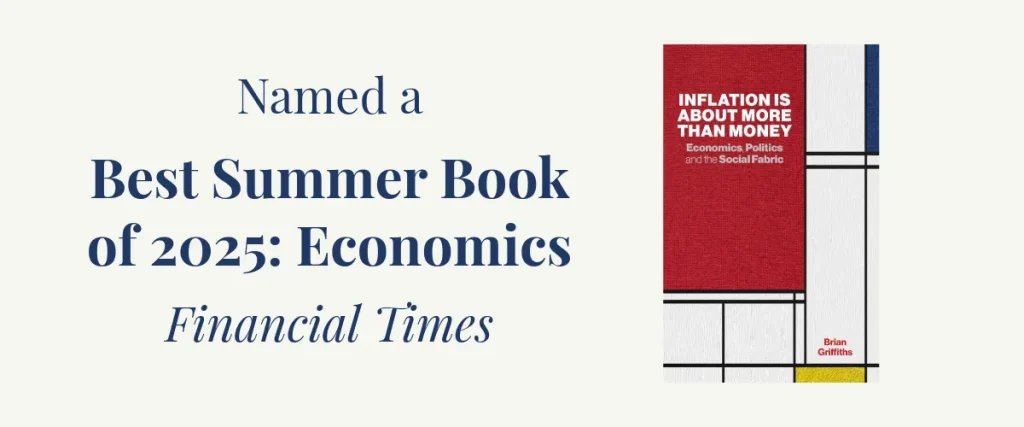June News Roundup

30 June 2025
We have compiled some news, comment pieces and announcements that we hope our readers will find interesting. In this instalment, there are stories relating to artificial intelligence, pensions and savings, state intervention in markets, and housing:
Another Review
 CEME’s latest publication, Inflation is About More Than Money, by Brian Griffiths, is on Martin Wolf’s list of ‘Best Summer Books of 2025: Economics’ at The Financial Times:
CEME’s latest publication, Inflation is About More Than Money, by Brian Griffiths, is on Martin Wolf’s list of ‘Best Summer Books of 2025: Economics’ at The Financial Times:
A New Blog
Paul Mueller – Central Banks and Inflation
Free Markets and State Intervention
Make America French Again, The Economist
The current United States administration, with its apparent preference for tariffs, state ownership and price controls, appears to be showing ‘dirigiste’ tendencies traditionally associated with the French government. While some businesses that stand to benefit are in favour of this, others are less enthusiastic. In the period when France and the U.S. were rather more similar than they are at present in terms of government involvement in markets, the performance of companies in both countries was somewhat weaker than it has been in America since President Reagan’s free-market reforms
Artificial Intelligence
Britain’s AI-care revolution isn’t flashy—but it is the future, The Economist
The care sector appears to be one area in which artificial intelligence can offer concrete benefits, with some providers using the technology to arrange the schedules of care staff, while others employ it to predict and therefore reduce falls among clients, or install devices similar to Amazon’s ‘Alexa’ so that residents of care facilities can request help, ask for drinks or make emergency calls. Many are keen to stress that there are limits to what AI can achieve and that in a fundamentally human sector, people should not be too heavily bound by technology and metrics and should take care not to follow the path of surveillance and control that such technology so easily affords: in short, AI exists to support rather than replace staff
Does anyone really want AI civil servants?, The Spectator
Given that artificial intelligence is known to ‘hallucinate’ and that it is as yet unclear how to address this problem, and given that AI models are trained on existing data, which raises questions about copyright, plagiarism and legal risk, should we be concerned about plans to put AI at the heart of the civil service, beginning with the implementation of an AI tool across the civil service? Will the risks and errors ultimately negate any efficiency savings? Perhaps the right approach is one of extreme caution
Disrupted or displaced? How AI is shaking up jobs, Financial Times
Many large companies are investing heavily in AI to boost productivity, leading to concerns over worker displacement. The trends differ according to the nature of the work, with some sectors seeing much higher rates of redundancy as a result of AI than others, though most people anticipate a radical restructuring of the employment landscape and the nature of work as automation becomes more prevalent. There are questions about how long this trend will last, but it is perhaps significant that, according to a report by PwC, revenue growth per employee is currently three times higher in the industries considered ‘most exposed’ to AI than in those considered ‘least exposed’. Does this mean that automation will replace more workers, or that AI renders individual members of staff more valuable?
Uber to bring self-driving cars on to Britain’s streets next year, The Telegraph
There are plans for the ride-hailing company Uber, in partnership with the Cambridge-based software company Wayve, to pilot autonomous vehicles on London’s roads next year. The tests will allow cars to operate without a human safety driver present at the wheel. Self-driving cars have been on streets in the United States for some years but have been accused of causing traffic jams and accidents. Following an accident in 2023 involving one of its Cruise taxis which caused serious injuries to a pedestrian, General Motors abandoned its autonomous vehicle programme. An earlier accident in which a pedestrian was killed involved an Uber vehicle, though Uber was found not to be criminally liable and the human safety driver entered a guilty plea of endangerment
Savings and Pensions
British pension policy is finally stepping in the right direction, Financial Times
The government’s proposed amendments to pensions appear to aim at consolidation and economies of scale, the idea being that the outcome will be a smaller number of larger schemes making more efficient use of capital through a wider range of investments. This article suggests that the aims of consolidation, productive investment and higher savings are laudable first steps in the right direction for addressing the failings of a fragmented pensions landscape that does not necessarily make the economy more productive
Rachel Reeves is about to do more damage to pensions than Gordon Brown, The Telegraph
An alternative view is that the reforms to pensions will reduce savings by removing tax incentives to use salary sacrifice schemes and by rendering private pensions liable to inheritance tax, and will also affect returns by allowing the state to assert control over where funds are invested. Thus, pensioners will be poorer and returns lower, while British equities will become less appealing because their ability to attract investment will depend less on performance in a competitive market than on arbitrary factors such as geographical location or state preference
Britain is saving but it’s not investing in the economy, The Times
Households in the UK are saving more of their disposable income but have a tendency to hold it in cash savings rather than invest in financial markets. Such behaviour is based on expectations about the likely value of property and the future generosity of state pensions, as well as fears about losing money through more ‘risky’ investments. It is possible, however, that people’s savings would work harder for them if invested earlier and in stocks, while also providing money which businesses could borrow in order to grow
Housing
Labour ‘will fall well short of target of 1.5m new homes’, The Times
With only 39,170 new homes receiving approval in England in the first three months of this year, together with reduced demand from first-time buyers and housing associations, it is expected that only around half of the 1.5 million new homes pledged by the government by 2029 will actually be built. Some have suggested that some kind of ‘demand support’ such as a ‘help to buy’ scheme would be required in order for the target to be met
